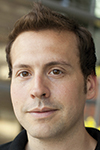Joshua W. Buckholtz
2016 Janet Taylor Spence Award
 Joshua W. Buckholtz
Joshua W. Buckholtz
Harvard University
scholar.harvard.edu/buckholtz/home
Please briefly describe your research interests.
The capacity for self-control is a defining feature of our species. Yet, while humans are good at self-control on the mean, the range of inter-individual variability in self-control is dramatic. We still know relatively little about the neurobiological mechanisms that produce this core feature of human variation. This is the central mystery that motivates my work. My lab is focused on identifying the specific large-scale brain circuits that drive individual differences in self-control, in order to understand how dysfunction within these circuits leads to impulsivity, aggression, addiction, antisocial behavior, and other forms of psychopathology. A second focus of our work is on uncovering the cognitive and neural foundations for social-norm-based cooperative behavior, particularly norm compliance and norm enforcement.
What was the seminal event, or series of events, that led you to an interest in your award-winning research?
I am a walking embodiment of the maxim “all research is me-search.” Throughout childhood and well into young adulthood, my own capacities for self-control were somewhat lacking. Fortunately, self-control did kick in eventually, but my early experiences with self-control failure made a deep and lasting impression, and I remain fascinated by a set of capacities that was elusive and mysterious to me during a very formative period.
Tell us about one of the accomplishments you are most proud of within this area of research. What factors led to your success?
I am insanely excited about one of our most recent discoveries (currently under review). This work identifies a specific circuit mechanism that predisposes self-control failure in incarcerated criminal psychopaths. In addition, we are able to show that circuit dysfunction can be “rescued” with targeted noninvasive brain stimulation. This work was made possible by a brilliant and determined set of graduate students, RAs and postdocs, especially Jay Hosking, Hayley Dorfman, Erik Kastman, and Ann Carroll.
What contributions, or contributors, to psychological science do you feel have had a major impact on your career path?
My father is a neuroscientist, and some of my earliest childhood memories involve father–son trips to his lab on Saturdays. Proust had his madeleines; I have solvents, scintillation vials, and animal bedding.
In high school, I got my first real taste of research while working in labs at the National Institute of Mental Health (NIMH). There, Kit Bonson and Steve Grant had a profound impact on my development as a scientist.
Joe Newman, my undergraduate research mentor at the University of Wisconsin-Madison, is responsible for transforming me into a psychological scientist. His class on psychopathy literally changed the course of my life, as did his kindness in allowing me to work in his lab. This was my first exposure to psychological research, and it ignited a passion for discovery that drives me still.
Joe Callicott, at the NIMH, decided to accept me into his lab as an RA despite (or possibly because of) my comically atrocious academic record. He, Danny Weinberger, and Andreas Meyer-Lindenberg gave me a rich tool kit and a massively integrative framework for answering scientific questions.
In graduate school at Vanderbilt, I was blessed with two amazing mentors — David Zald and Rene Marois. I can’t imagine better scientific role models. Each, in different ways, taught me the essential elements of success as a scientist.
I continue to be influenced by my world-class colleagues, and I couldn’t ask for a more supportive and intellectually nurturing department. Mahzarin Banaji, Randy Buckner, Mina Cikara, Fiery Cushman, Sam Gershman, Dan Gilbert, Josh Greene, Jill Hooley, Ellen Langer, Rich McNally, Ken Nakayama, Matt Nock, Steve Pinker, Dan Schacter, Leah Somerville, Felix Warneken, and John Weisz have all had a particularly salutary impact on how I think about psychological science. Outside of my department, I am especially grateful for the mentorship of Lisa Feldman Barrett and Judy Edersheim, and for colleagues and collaborators such as Arielle Baskin-Sommers, Joan Camprodon, Molly Crockett, David Faigman, Judge Nancy Gertner, Uma Karmarkar, Valerie Reyna, Alexandra Rosati, Greg Samanez-Larkin, and Chris Slobogin. And of course, my bizarro-world science twin, Michael Treadway.
What does winning this award mean to you both personally and professionally?
Since I was a kid, the only thing I ever wanted was to be a scientist. Winning this award is an occasion to reflect upon and appreciate all of the people who have made that fantastical dream a reality. All of the people above made that possible, but I would be nothing without my indefatigable partner, Ashley; our kids, Leo, and Natasha; my endlessly supportive parents; and my inspiring siblings.

